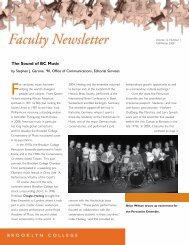Volume 14, Number 2 - Spring 2011 - Brooklyn College - CUNY
Volume 14, Number 2 - Spring 2011 - Brooklyn College - CUNY
Volume 14, Number 2 - Spring 2011 - Brooklyn College - CUNY
Create successful ePaper yourself
Turn your PDF publications into a flip-book with our unique Google optimized e-Paper software.
The Search for Happiness<br />
“My own view is<br />
that happiness is<br />
best represented by<br />
the life satisfaction<br />
view, a subjective<br />
theory that judges<br />
a person as happy<br />
when she is<br />
satisfied with<br />
her life or views<br />
it positively.”<br />
— Christine Vitrano<br />
One reason many philosophers find the<br />
Aristotelian perspective appealing is that it<br />
makes all immoral behavior irrational. Once<br />
you recognize the independence of morality<br />
and happiness, you introduce the possibility<br />
that one can have rational reasons for behaving<br />
immorally, and you must face the dreaded<br />
question of why one should be moral, if being<br />
moral doesn’t make one happy. The Aristotelian<br />
outlook offers an easy reply: Being moral will<br />
make you happy. But let’s be realistic: Using the<br />
terms “moral” and “happy” in a modern context,<br />
and linking them in an Aristotelian way, clashes<br />
with life as we know it today. People have<br />
reasons for acting immorally, and we should not<br />
pretend we live in a world in which all happy<br />
people are moral, and all immoral people are<br />
doomed to unhappiness.<br />
Therefore I believe that recognizing<br />
the independence of happiness provides<br />
philosophers with the resources needed to<br />
characterize accurately people’s motivations<br />
and behavior. The claim that happiness is an<br />
independent evaluative domain implies that<br />
considerations of happiness may provide one<br />
with reasons for acting that conflict with other<br />
considerations, such as moral or prudential<br />
duties. The upshot of the life satisfaction view<br />
is that while happiness is widely desired, it is<br />
only one good among others.<br />
I would like to conclude by relating an<br />
experience I had while traveling in East Africa.<br />
Our party had the opportunity to visit a<br />
traditional Maasai village in Kenya, and on the<br />
way our tour guide gave us a brief lesson on<br />
their culture. He explained that the Maasai<br />
have a nomadic lifestyle revolving around their<br />
cattle. The Maasai live in small huts made out<br />
of cow dung and sleep on beds made from the<br />
cowhides. The cattle also provide food for<br />
the Maasai, whose diet consists of cattle meat,<br />
milk and blood. So the wealth of the Maasai<br />
is measured solely in terms of their cattle;<br />
amassing other material possessions is useless.<br />
As we approached the village, our guide<br />
issued a stern warning: “Do not pity these<br />
people. They are happy.” I was just completing<br />
my dissertation at this time, and I took to heart<br />
what he meant. He was urging us not to judge<br />
the Maasai on their comparative lack of material<br />
possessions but to look instead at how they live,<br />
and more importantly, to appreciate their lives<br />
from their own perspective. When we met with<br />
the Maasai, it was clear they were happy, taking<br />
great pride in their traditional lifestyle. In short,<br />
the satisfaction they found in their ways is after<br />
all the essence of happiness.<br />
I came away from Christine Vitrano’s<br />
thought-provoking piece believing<br />
college professors – lovers of<br />
knowledge, music, rocks, canals and<br />
pretty much anything else – must be<br />
the happiest people around, by the<br />
standards of anyone, Aristotelian<br />
or hedonistic.<br />
And I also came to believe that<br />
the center of academic pleasure was<br />
a campus in <strong>Brooklyn</strong>.<br />
To confirm my theories, I rushed<br />
to the outsized virtual Gothic library<br />
known as Google, and I plugged in<br />
the words “college” and “professors”<br />
and “happiness.”<br />
Up popped a notice of 17.5 million<br />
results; and the very first one was,<br />
yes, our very own Christine Vitrano.<br />
What εεεεεεὐδαιμονία!<br />
Excuse me, I mean<br />
what happiness!<br />
Clearly this meant <strong>Brooklyn</strong><br />
<strong>College</strong> possessed the secret to<br />
true joy.<br />
Ah, but ever the doubter, I soon<br />
felt rising in me the need for<br />
further proof.<br />
So on a spring break day, I<br />
sauntered over to Whitehead Hall<br />
to find more evidence for my<br />
hypothesis, and there I found my<br />
friend and colleague, Professor<br />
Miguel Macias, of the department of<br />
television and radio, at work.<br />
4 5<br />
On entering his office, I exchanged<br />
greetings with Miguel and told him<br />
what brought me there – my quest to<br />
prove our college was home to the<br />
happiest professors in the country.<br />
Graciously taking a break from<br />
the computer, Miguel agreed to<br />
answer a few questions.<br />
Faculty Newsletter: What are you<br />
doing on campus during spring break?<br />
Macias: This week mainly I’m meeting<br />
with students and also grading some<br />
of their assignments. I give a good<br />
number of assignments, probably a<br />
total of 10 a semester, maybe more.<br />
So every given week I have maybe<br />
two batches at a time to look at. For<br />
every assignment, I send the student<br />
an e-mail with comments . . . because<br />
I’ve decided that the only way to<br />
do my job properly was to provide<br />
them feedback for every assignment<br />
. . . But, of course, that generates a<br />
tremendous amount of work.<br />
FN: Does doing this make you happy?<br />
Macias: (In summary) Not necessarily.<br />
So we talked a little more about<br />
Aristotle and I wondered: If happiness<br />
isn’t the doing of Aristotelian duty,<br />
like grading a gazillion papers, then<br />
what is it? I glanced over at the guitar<br />
case sitting near Miguel’s desk. I<br />
Miguel Macias,<br />
Television and Radio<br />
We Have Concluded: <strong>Brooklyn</strong> <strong>College</strong><br />
Professors Are the Happiest of All By Ron Howell<br />
recalled the time when Miguel spoke<br />
of playing pop rock onstage. Hmmm.<br />
Macias: Obviously I have moments of<br />
joy while I’m teaching or meeting with<br />
students on campus. [But] it’s more<br />
a sense of duty . . . I have an idea of<br />
what doing my job well means. I have<br />
my idea, and it’s a pretty strict one. .<br />
. . To a certain extent I would not be<br />
at peace with myself if I didn’t feel I<br />
was doing my job right. That gives me<br />
peace of mind, and then I can move<br />
on and try to find things that give<br />
me personal happiness. So it’s like a<br />
“prereq” for me to be able to go on<br />
and find happiness.<br />
Well, that settled it as far as I<br />
was concerned. Neither Aristotle<br />
nor I need million-dollar surveys<br />
to confirm truth when we hear it<br />
and recognize it. <strong>College</strong> teaching<br />
is happiness of the old and the new<br />
sort. Its essential pleasures are not<br />
adorned in a plethora of colors,<br />
nor hungered after by the purveyors<br />
of reality shows. But it’s ever open<br />
to a happy tune. And it’s finest<br />
expression is in <strong>Brooklyn</strong>.<br />
This is something that I<br />
instinctively knew, and I now feel<br />
compelled to thank Professor<br />
Christine Vitrano for making me<br />
more aware of it and for teasing<br />
me into adding Aristotle, and her,<br />
to my summer reading list.


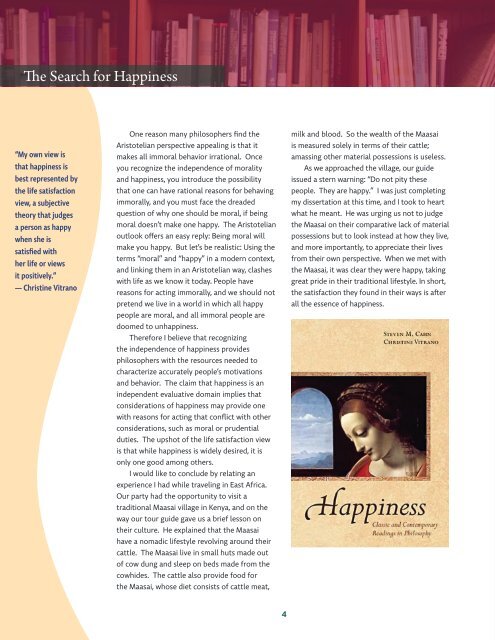
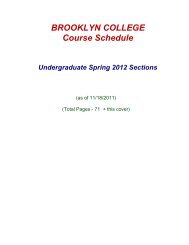

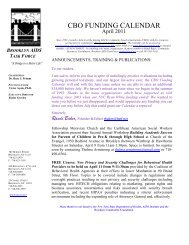
![PHIL 3314: Moral Issues in Business [Lindsay] - Brooklyn College ...](https://img.yumpu.com/12442928/1/190x245/phil-3314-moral-issues-in-business-lindsay-brooklyn-college-.jpg?quality=85)
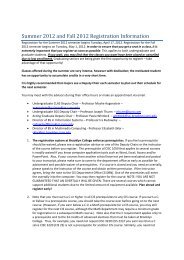
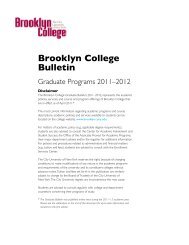

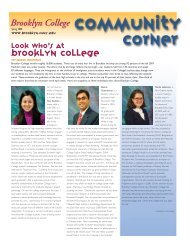

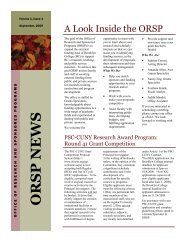
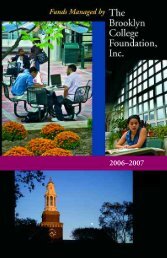
![CORC 3306: Scientific Revolutions [Menser] - Brooklyn College ...](https://img.yumpu.com/5776630/1/190x245/corc-3306-scientific-revolutions-menser-brooklyn-college-.jpg?quality=85)
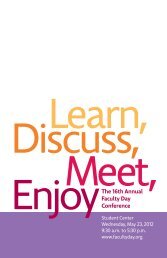
![PHIL 3309: Environmental Ethics [Menser] - Brooklyn College - CUNY](https://img.yumpu.com/5776371/1/190x245/phil-3309-environmental-ethics-menser-brooklyn-college-cuny.jpg?quality=85)
